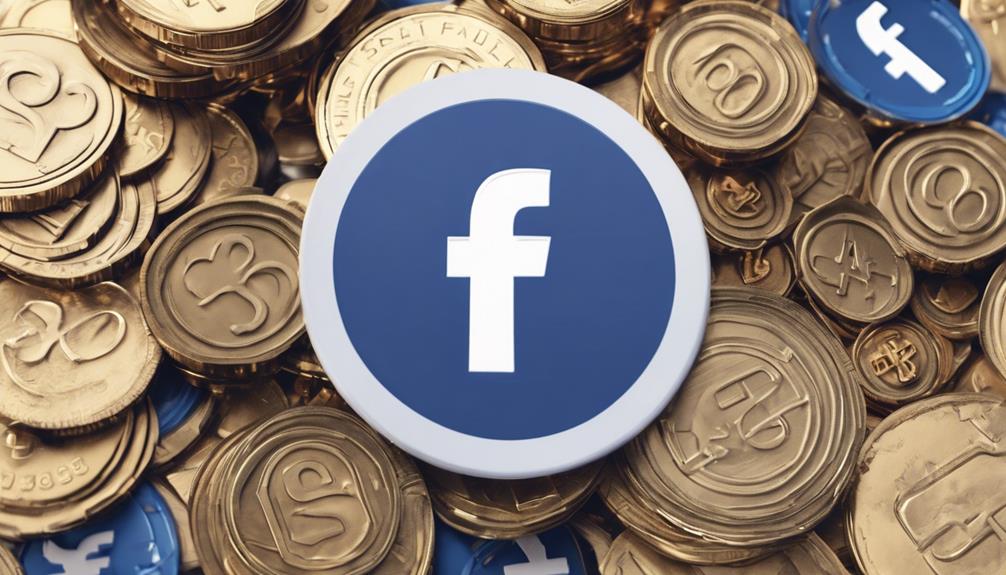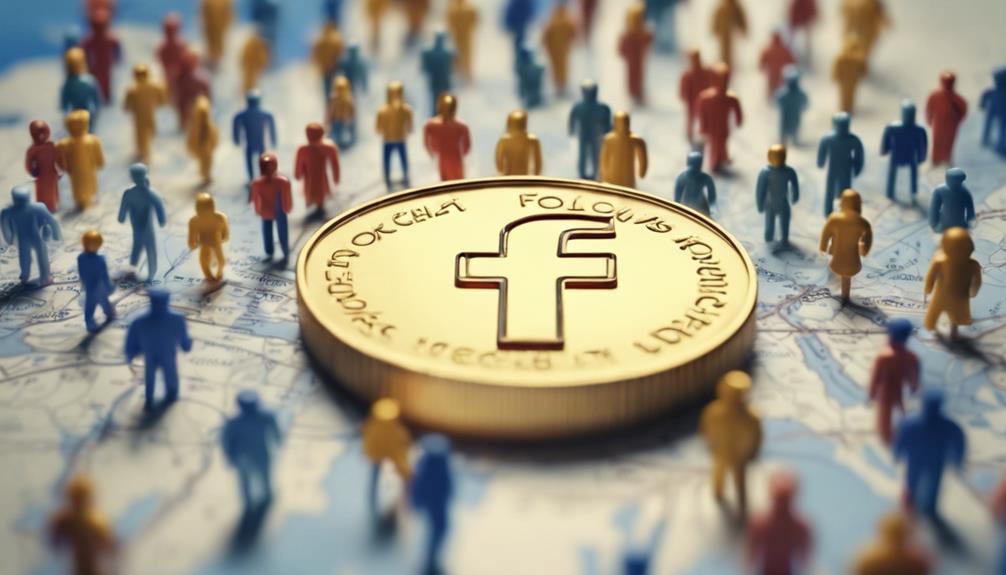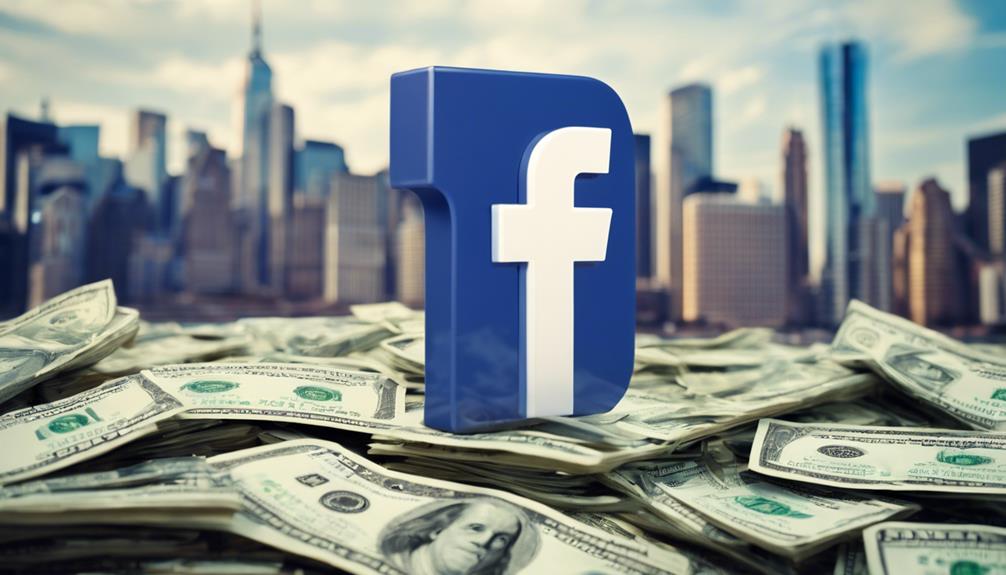
How much does Facebook pay for likes?
You’ve likely heard the myth that Facebook lines your pockets for every ‘like’ your page garners, a modern spin on the old adage, ‘every penny counts’.
However, the truth of Facebook’s monetization model might surprise you. So, how much does the social media titan actually pay for likes? Spoiler alert: It’s not as simple as a straightforward transaction.
Stick with us to uncover the complex mechanisms behind Facebook’s revenue generation and the real influence of likes on your earning potential. It’s a journey worth embarking on.
Key Takeaways
- Facebook does not directly pay for likes, instead, it values organic engagement and genuine interactions.
- Like farming’ or buying likes can harm content visibility and brand reputation due to Facebook’s algorithm preferences.
- Genuine likes can enhance brand authenticity, improve reach, and engage potential customers, indirectly contributing to revenue.
- Likes play a pivotal role in Facebook’s marketing strategy by influencing content visibility, customer engagement, and brand perception.
Understanding Facebook Monetization

To fully grasp how much Facebook pays for likes, you first need to get your head around the concept of Facebook monetization. It’s not as simple as you might think. Facebook’s monetization strategies are multi-faceted, revolving around advertising, content boosting, and data marketing.
It’s crucial to understand that Facebook doesn’t pay its users directly for likes. Instead, likes are part of a more extensive system that increases the visibility and reach of your content. This visibility, in turn, can lead to monetization. When you create engaging content that resonates with your audience, they’re likely to ‘like’ it. These likes improve your content’s ranking in Facebook’s algorithm, boosting its visibility to a broader audience.
Content boosting is another key aspect of Facebook’s monetization strategy. You can pay Facebook to ‘boost’ your content, pushing it to the top of your audience’s news feeds. This increases its visibility and, hopefully, the number of likes it receives. The more likes you get, the more people see your content, and the more opportunities you have to monetize your online presence.
Understanding these monetization strategies is the first step towards grasping how Facebook’s payment for likes works.
The Myth of Pay-Per-Like
You might’ve heard of the ‘Pay-Per-Like’ concept, suggesting that Facebook pays for likes. But what’s the actual monetary value of these likes, if any?
Let’s debunk this myth and explore Facebook’s official stance on the matter.
Understanding Pay-Per-Like Concept
Let’s debunk the myth: Facebook doesn’t directly pay for likes, but that doesn’t mean they’re worthless. In the digital arena, the value of likes is somewhat twisted by the notion of ‘like farming’. This practice, fraught with dangers, involves generating numerous likes for content, often through sketchy means.
This leads to the ‘fake likes’ issue, where content appears popular due to inflated numbers, not genuine engagement. While it might seem beneficial initially, it’s quite the opposite. Fake likes don’t correspond to actual consumer interest, rendering your metrics misleading. They distort the authenticity of your brand, making innovation less impactful.
Monetary Value of Likes
While the idea of buying likes can seem tempting, it’s crucial to understand that the monetary value of likes is a complex matter shrouded in myth. Don’t fall victim to the allure of ‘like farming’—the practice of artificially inflating likes. It’s a dangerous game, and here’s why:
- Algorithm Influence: Facebook’s algorithm favors authentic engagement. Inorganic likes can actually harm your visibility.
- Like Farming Dangers: Fake likes won’t convert to real engagement or sales. In fact, they can damage your brand’s reputation.
- Investment Returns: The financial return on bought likes is virtually nonexistent.
Facebook’s Official Stance
Despite the pervasive myth, Facebook has officially stated that they don’t pay for likes or engagement on their platform. They’re adamant about maintaining Facebook’s transparency and user privacy. This means they won’t compromise your data for monetary gain. Instead, they’re focused on creating an engaging and innovative platform that values user interactions. They believe in organic growth, advocating for genuine engagement rather than paid popularity.
Although many claim that Facebook pays for likes, these allegations are baseless, according to the company’s official stance. So, instead of worrying about the myth of pay-per-like, it’s time to concentrate on delivering quality content that resonates with your audience. After all, authenticity is the true currency in the world of social media.
Facebook’s Revenue Generation Model
You might wonder how Facebook makes money if it doesn’t pay for likes. It’s all about their revenue model: advertising plays a significant role, user data is monetized, and in-app purchases bring in additional income.
Let’s unpack these aspects to get a clearer picture of Facebook’s financial workings.
Advertising’s Role in Earnings
Facebook’s revenue generation model heavily relies on advertising, transforming each user’s click, like, and share into tangible earnings. The beauty of this model is that it’s influenced by three crucial factors:
- Ad Campaigns Effectiveness
Ad Campaigns’ effectiveness isn’t just about creating compelling ads, it’s about making sure they’re seen by the right people.
- Social Media ROI (Return on Investment)
Social Media ROI is the return on every dollar spent on advertising. High ROI means your campaigns are working.
- User engagement
User engagement, which refers to likes, shares, and comments, generates more visibility for the ads.
All these intertwined factors contribute to Facebook’s impressive earnings. So next time you click, remember, you’re part of this massive, innovative revenue machinery.
Understanding User Data Monetization
Delving into the heart of Facebook’s revenue generation model, it’s essential to understand how user data monetization works. Your every click, like, and share are valuable assets to Facebook, shaping its ad-targeting strategies. This data-driven approach fuels their revenue, but it’s not without controversy. Data privacy concerns are at the forefront, as users question the extent of information collected.
User consent issues also arise, with critics questioning the transparency of Facebook’s data policies. Are you fully aware of how your data is utilized? While Facebook innovates and reaps financial benefits, it’s key to remain informed and vigilant.
As we navigate this digital era, understanding the dynamics of data monetization and its implications becomes increasingly crucial.
Dynamics of In-App Purchases
While understanding data monetization provides insight into Facebook’s profit-making strategies, another significant aspect of their revenue generation model lies in in-app purchases.
- In-app currencies: They’re a clever way Facebook entices you to spend. It’s not just about buying a product; it’s about buying into an experience. These virtual currencies, whether it’s Facebook Credits or game-specific coins, hold real-world value.
- Player spending habits: Facebook’s algorithm cleverly tracks and analyzes your spending tendencies. It notes what you’re willing to spend on, how frequently, and adjusts its offerings accordingly.
- Emotional connection: Facebook leverages your connection to the app or game, making you more likely to spend. Whether it’s advancing in a game or enhancing your social experience, in-app purchases appeal to your desires.
In essence, Facebook’s in-app purchase model brilliantly combines technology and psychology to drive revenue.
Impact of Likes on Facebook Marketing
Understanding the impact of likes on your Facebook marketing strategy can dramatically influence your brand’s online visibility and customer engagement. It’s essential to comprehend the nuances of ‘Like Authenticity’ and ‘Like Inflation’. Genuine likes from your target audience support the authenticity of your brand, increase your reach, and engage potential customers. Contrarily, inflated likes, garnered through artificial means, may initially boost your visibility but can harm your brand’s reputation in the long run.
Likes serve as social proof, legitimizing your brand’s online presence. A high number of likes signals to potential customers that your brand is trustworthy and popular. Yet, it’s not just about the quantity. The quality of these likes is equally important. Genuine interaction from engaged followers boosts your brand’s credibility far beyond what mere numbers can achieve.
In a landscape continuously evolving with innovation, it’s crucial to adapt your Facebook marketing strategy. Strive for authentic engagement rather than falling into the trap of like inflation. Remember, it’s the quality of your interactions, not the quantity of your likes, that ultimately defines your brand’s success on this platform.
Earning Through Facebook: Real Ways

Navigating the world of Facebook, you’ll find real, legitimate ways to earn money, from promoting your own products or services to joining the Facebook Audience Network. This isn’t some get-rich-quick scheme, it’s about using the platform’s capabilities to your advantage.
- Facebook Partnerships: Partnering with Facebook can be a gold mine. They’re constantly seeking innovative creators and businesses to collaborate with. If you’re a content creator, these partnerships can provide you with exclusive benefits and monetization opportunities.
- Sponsored Posts: There’s a big market for sponsored posts on Facebook. Brands are always hunting for influencers or popular pages to promote their products. With a strong follower base, you can earn by creating and posting content that subtly endorses these brands.
- Selling Products or Services: Your Facebook page isn’t just for sharing memes or family photos. It can be an online storefront for your business. Whether it’s handmade jewelry or professional consulting services, you can sell directly to your followers.
Advertisements and Facebook Income
In understanding how Facebook profits from likes, it’s essential to look at their ad revenue breakdown.
You’ll see how user engagement directly impacts Facebook’s income.
Moreover, the process of monetizing likes is a key part of their strategy.
Facebook’s Ad Revenue Breakdown
To truly grasp how Facebook rakes in its income, we’ll delve into the intricacies of its ad revenue breakdown.
- Ad Targeting Techniques: Facebook employs advanced targeting methods that allow advertisers to reach a specific demographic. This precision is a key factor in its ad revenue success.
- User Privacy Concerns: Monetizing user data is a central component of Facebook’s revenue model. However, this has sparked significant concerns about user privacy.
- Ad Revenue: The majority of Facebook’s income stems from advertising. In fact, as of 2020, about 98% of its total revenue was ad-based.
Understanding these aspects can help you comprehend the magnitude of Facebook’s ad revenue and its ability to monetize ‘likes’. Stay ahead by anticipating the next big innovation in social media advertising.
Impact of User Engagement
You’ll find that user engagement, particularly the interaction with ads, significantly drives Facebook’s revenue growth. Engagement metrics reveal the strength of this impact. As user behavior changes, so does Facebook’s income.
Consider this table:
| Engagement Metrics | Impact on Facebook Income |
|---|---|
| Clicks | Increased ad revenue |
| Shares | Broader reach, potential for more ad views |
| Likes | More personalized user experience, higher likelihood of future engagement |
Each click, share, or like on an ad contributes to Facebook’s bottom line. The more you interact, the more Facebook earns. This correlation might make you think twice about your own engagement. Indeed, your clicks and likes aren’t just shaping your social media experience; they’re also shaping Facebook’s financial future.
Monetizing Likes: The Process
Understanding how Facebook monetizes likes and turns them into income requires a deep dive into the world of online advertising. Here’s the process:
- Advertisers pay Facebook to display ads to you, based on your interests and behavior.
- Every ‘like’ you give increases your interaction with the platform, improving Facebook’s understanding of your preferences, effectively influencing the algorithm.
- Subsequently, Facebook can provide more targeted advertising, thus increasing their income.
However, you must be aware of ‘Like Farming Dangers’. Some pages gather likes only to sell the page to the highest bidder, often leading to spam or scams. Hence, it’s quintessential to engage wisely.
Embrace innovation but remember – your online presence is your digital footprint. Make it count.
Role of User Engagement on Revenue
The impact of user engagement on revenue is a crucial aspect to consider when examining Facebook’s monetization strategy. With Engagement Analytics, you can dive deeper into understanding how user interactions influence the platform’s financial performance. Each comment, share, or like isn’t just a simple interaction, but a potential revenue stream.
User engagement drives advertising. When you interact with content on Facebook, you’re essentially providing insights about your preferences. This valuable information is then used by advertisers to target you with more specific ads. The more you engage, the more ads you’ll see, and the more revenue Facebook generates.
Revenue Forecasting can help predict the future financial performance of Facebook based on current user engagement trends. For instance, an increase in user engagement can signify a probable surge in revenue. On the flip side, a decrease in engagement can signal potential revenue dips.
In essence, user engagement is the lifeblood of Facebook’s revenue model. It’s not about how much Facebook pays for likes, but how these likes and other forms of engagement translate into substantial revenue. So, your interaction on the platform isn’t just a click – it’s a catalyst for Facebook’s financial growth.
The Power of Facebook Followers

Harnessing the power of your Facebook followers can dramatically amplify your reach and engagement, serving as a significant driver for the platform’s revenue. Your followers can transform from passive spectators to active participants, offering a two-way channel for communication and interaction.
This dynamic relationship is driven by two key elements: Social Influence and Virality Factors. Here’s how they play out:
- Social Influence: Your followers can serve as social proof, validating your content’s value and spreading it through their networks. This peer validation can significantly amplify your message’s reach and impact.
- Virality Factors: Your content’s virality is directly proportional to your followers’ engagement. The more they like, share, and comment, the more Facebook’s algorithm favors your content, potentially leading to exponential growth.
- Revenue Impact: Your followers act as unpaid marketers, spreading your content and attracting more traffic. This increased visibility can drive more ad impressions, generating more revenue for both you and Facebook.
Understanding and leveraging these dynamics can help you maximize your Facebook strategy’s effectiveness. Remember, your followers aren’t just numbers; they’re your brand ambassadors. Nurture this relationship, and watch your influence grow.
Decoding Facebook Ad Revenue
While your followers indeed play a key role in your Facebook strategy, let’s not overlook the significant part that Facebook’s ad revenue plays in the overall equation. This revenue stream, derived from advertisers who pay to reach Facebook’s vast user base, is a key driver of the social media giant’s profitability.
However, it’s not an entirely smooth sailing. Ad Fraud, a pervasive issue in digital advertising, threatens the efficacy of this revenue model. It involves bots and fraudulent accounts mimicking legitimate user behavior to deceive advertisers, inflating the cost per engagement and disrupting the return on investment.
Meanwhile, Facebook’s continual innovation in Social Commerce provides a promising avenue for bolstering its ad revenue. By integrating e-commerce capabilities directly into the social platform, Facebook can provide advertisers with a more direct path to sales, enhancing the value of its ad space.
The Influence of Facebook on Business

In navigating your business’s digital presence, Facebook’s influence can’t be underestimated, with its robust ad system and wide user base offering a potent platform for reaching prospective customers. The power of Facebook lies in its algorithms and the ethical use of social media to connect with your audience.
Here are three key ways Facebook’s influence is shaping the business landscape:
- Facebook’s Algorithms: Your content’s visibility is largely dictated by Facebook’s ever-evolving algorithms. Understanding these algorithms can help you create content that resonates with your audience, thereby enhancing engagement and visibility.
- Targeted Advertising: Facebook’s ad system allows you to target specific demographics, optimizing your ad spend and increasing your reach. It’s a cost-effective way to connect with potential customers who might be interested in your product or service.
- Social Media Ethics: In the age of information overload, ethical use of social media is paramount. It’s critical to provide accurate information, respect user privacy, and promote positive interactions on your page.
Fact-Checking Facebook Monetization Myths
As you navigate the complexities of Facebook’s algorithms and ad system, you might come across several myths about how the platform monetizes, particularly concerning the concept of getting paid for likes. These monetization misconceptions can hinder your understanding of the platform and its potential for your business.
To dispel some of these Facebook myths, let’s fact-check a few commonly held beliefs:
| Facebook Myth | The Truth |
|---|---|
| Facebook pays you for likes | Facebook doesn’t directly pay for likes, but likes can increase visibility and engagement |
| More likes equate to more revenue | Not necessarily, revenue is more related to engagement & conversions |
| Only posts with thousands of likes make money | Even posts with fewer likes can generate revenue if they lead to conversions |
| Purchasing likes improves monetization | Purchased likes often lack engagement, offering little actual value |
| Ads are the only way to monetize | There are other ways to monetize like branded content, partnerships, etc. |
Understanding these misconceptions can help you better leverage Facebook’s potential. Remember, innovation and strategic engagement, rather than chasing likes, should be your primary focus.

